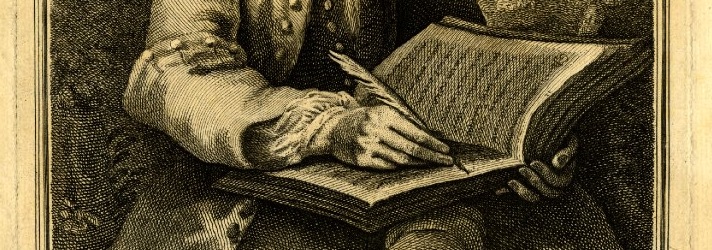“R.”
“The Toasts. A Fable”
Satan one day (one night I mean,
For days in Hell are seldom seen)
At Pandemonium in state
Among his peers carousing sat,
To celebrate our parents fall 5
In draughts of liquid fire and gall;
The toasts in bumpers flew around,
The palace roofs the toasts resound,
And all was noise, yet all unite
To pelt Heav’n with their blunted spite: — 10
Beelzebub gave his harlot PRIDE,
To match whose charms he Hell defy’d;
ENVY by Baäl then was given,
Foe to herself, to earth, and Heav’n;
AV’RICE was Mammon’s toast, a vice 15
Wou’d make a Hell of Paradise: —
My toast, cries Ashteroth, shall be
That Janus-prude, HYPOCRISY;
And mine, quo’ Belial, — IDLENESS,
Whose charms both fiends and men confess; 20
Dear IDLENESS! to whom we owe
Myriads on myriads here below; —
Dagon gave FALSEHOOD, a mean jest,
Still mask’d, and cloath’d in rainbow-vest;
A will o’ th’ wisp, that leads astray, 25
A coward vice, that dreads the day; —
Moloch gave blood-stain’d CRUELTY, —
And Thammuz, INFIDELITY;
But to that toast they all objected
As one, no fiend there recollected, 30
(For, tho’ such weeds on earth may grow,
There are no infidels below);
Thammuz on this, — since change he must, —
Gave that sweet creature, Madam LUST:
In short, each demon, in his toast, 35
Avow’d which fair he honour’d most.
The turn at length to Satan came
To bumper round his darling flame;
“I own that all your toasts,” he cried,
“Are beauties long approv’d and try’d, 40
But I’ll give one, in whom alone
The quintessence of Hell is shown,
INGRATITUDE! – of vices first,
Most infamous, and most accurst,
That fiend in grain! that hydra-pest! 45
(Behold her image on my breast)
To her Hell’s empire owes its birth,
To her I owe those swarms from earth;
When other vices rule the mind,
VIRTUE, by fits, may entrance find, 50
But let INGRATITUDE bear sway,
Not VIRTUE’s shade dare cross her way;
E’en Hell itself, when she appears,
A more than double darkness wears; —
Then in a bumper toast the belle, 55
As premier beauty here in Hell .”
The fiends aloud the toast proclaim,
And Hell rethunders with her name;
“INGRATITUDE! of vices first,
Most infamous, and most accurst.” 60
York.
NOTES:
Title Toasts “Any person, male or female, whose health is proposed and drunk to” (OED).
1 Satan “In Christian theology: the proper name of the Devil, the supreme embodiment or spirit of evil” (OED).
3 Pandemonium “A place represented by Milton in Paradise Lost as the capital of hell, containing the council chamber of the Evil Spirits” (OED).
4 carousing “To drink a full bumper to his or her health” (OED).
6 draughts “The drawing of liquid into the mouth or down the throat; an act of drinking” (OED); gall “A wind of considerable strength” (OED)
7 bumpers “A cup or glass of alcoholic drink filled to the brim, esp. for a toast” (OED).
11 Beelzebub “In the Bible, the prince of the devils” (Britannica).
13 Baäl A Canaanite god; one of the seven princes of Hell.
15 AV’RICE “Inordinate desire of acquiring and hoarding wealth”(OED); Mammon The personification of avarice and greed in Milton’s Paradise Lost (Book I, line 678); sometimes figured as one of the seven princes of Hell (OED).
17 Ashteroth Variant of “Astaroth” who, along with Lucifer and Beelzebub, made up the evil trinity in Hell (The Occult Encyclopedia).
18 Janus Ancient Roman deity, “regarded as the doorkeeper of heaven, as guardian of doors and gates, and as presiding over the entrance upon or beginning of things” (OED).
19 Belial “The spirit of evil personified; used from early times as a name for the Devil or one of the fiends, and by Milton as the name of one of the fallen angels (Paradise Lost, Book I, line 490) (OED).
22 Myriads “A countless number of specified things,” here alluding to souls in Hell (OED).
23 Dagon “The national deity of the ancient Philistines; represented with the head, chest, and arms of a man, and the tail of a fish;” also referenced by Milton in Paradise Lost (Book I, line 462).
24 rainbow-vest Colourful clothing.
25 will o’ th’ wisp “A phosphorescent light seen hovering or floating at night over marshy ground” (OED).
27 Moloch “A Canaanite diety associated in biblical sources with the practice of child sacrifice” (Britannica).
28 Thammuz “A Syrian diety” and minor demon, also represented in Milton’s parade of demons in Hell (Paradise Lost Book I, line 446) (OED).
32 infidels “A disbeliever in religion or divine revelation generally” (OED).
36 Avow’d “To declare, affirm” (OED).
42 quintessence “The most perfect embodiment of a certain type of person or thing” (OED).
43 INGRATITUDE “Mortal sin is … ingratitude towards the most constant love; it is the adultery of the soul” (OED).
45 hydra-pest “And I stood upon the sand of the sea, and saw a beast rise up out of the sea, having seven heads and ten horns, and upon his horns ten crowns, and upon his heads the name of blasphemy” (Revelations 13:1-10).
58 Rethunders “To make a loud, echoing sound like that of thunder; to resound. Frequently poetic” (OED).
SOURCE: The Gentleman’s Magazine, vol. 46 (January 1776), pp. 229-230. [J. Paul Leonard Library]
Edited by Alban Fenn

